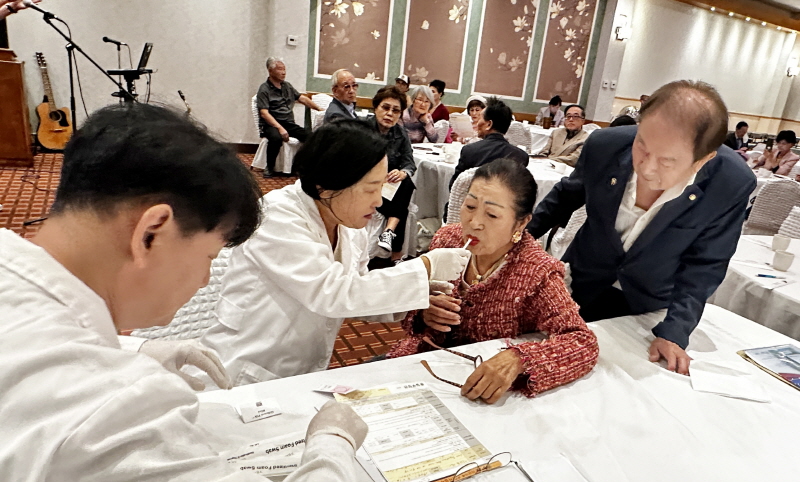Shortly after the outbreak of the Korean War, then 6-year-old Bok-seon Cho (80) and her younger sibling fled to her grandmother’s house in Kaesong. The sisters were separated during the 1951 January 4 Retreat.
“We took refuge at my grandmother’s house in Kaesong, and after the North Korean army retreated, my father came to take us back to Seoul,” said Cho. “However, my 3-year-old sister refused to go, holding onto my grandmother’s hand, and my father only took me to the South. Since then, I have no idea whether my sister is alive or dead.”
Now undergoing DNA testing to find separated families, Cho expressed, “I hope for reunification, but I just want to know if my sister is still alive.”

On October 21, around 30 displaced North Korean natives, now in their 70s and 80s, gathered at YongSuSan in LA’s Koreatown for the “DNA Testing for Overseas Separated Families” event. With not much time left in their lives, they long to at least confirm the fate of their family members left behind in North Korea.
The event was organized by the California chapter of the National Coalition on Divided Families, with support from the South Korean Ministry of Unification. This DNA test for overseas displaced persons marks the first of its kind outside of South Korea.
Approximately 30 participants from southern California completed the “Unification Ministry’s Separated Families DNA Testing and Data Storage Application.” Two employees from the Dawjin Genetic Research Institute, who traveled from Korea, collected hair and oral cell samples from the applicants.
According to the organizers, the Ministry of Unification has been conducting DNA testing and building a database since 2014, considering the aging issue of separated families. To date, over 27,700 members of the first generation of separated families have left their DNA data in hopes of reuniting with their loved ones. The Ministry is now extending testing to the second and third generations.
Hwang Chun-hong, CEO of the DowGene DNA Research Institute, said, “Based on the DNA data left by the applicants, we will compare their information with the genetic data of family members in the South and North, making it possible to reunite separated families. Starting this year, we began DNA testing for overseas families, and with many separated families living in the U.S., we plan to offer annual testing in places like LA.”
According to DowGene, the accuracy of DNA testing for family verification is 99.9%. Even if the first generation passes away, it is still possible to confirm familial relations through DNA tests between the second and third generations.
Choi Chang-jun, head of the California branch of the National Coalition on Divided Families, said, “I hope that through DNA testing, we can preserve the records of displaced families and, before it’s too late, help them reunite with the families they left behind in North Korea.”
BY HYOUNGJAE KIM, YOUNGNAM KIM [kim.youngnam@koreadaily.com]




